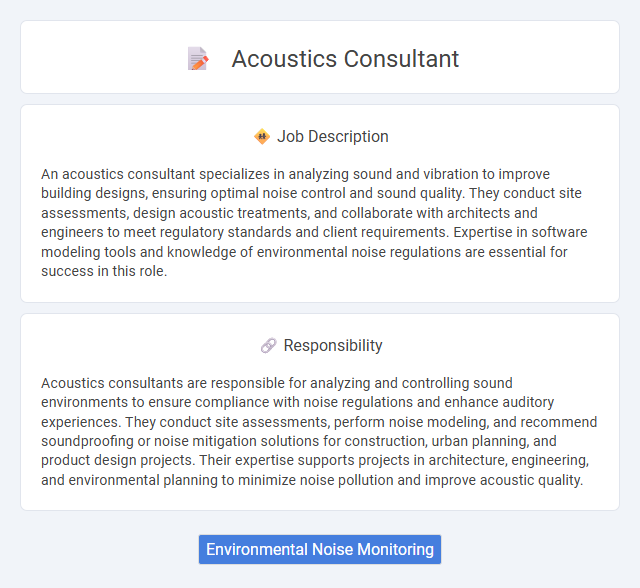
An acoustics consultant specializes in analyzing sound and vibration to improve building designs, ensuring optimal noise control and sound quality. They conduct site assessments, design acoustic treatments, and collaborate with architects and engineers to meet regulatory standards and client requirements. Expertise in software modeling tools and knowledge of environmental noise regulations are essential for success in this role.
Individuals with a strong interest in sound science and attention to detail are likely to excel as acoustics consultants, given the technical nature of the work. Those who prefer working in dynamic environments and enjoy problem-solving related to noise control and sound quality might find this career suitable. People who thrive in collaborative settings and possess good communication skills are probably better suited for the client-facing aspects of the role.
Qualification
Acoustics consultants typically require a degree in acoustics, physics, engineering, or environmental science, coupled with specialized training in sound measurement and analysis. Professional certifications such as those from the Institute of Acoustics (IOA) or the Acoustical Society of America (ASA) enhance credibility and demonstrate expertise. Strong knowledge of acoustic modeling software, noise control regulations, and building codes is essential for effective consultancy and project success.
Responsibility
Acoustics consultants are responsible for analyzing and controlling sound environments to ensure compliance with noise regulations and enhance auditory experiences. They conduct site assessments, perform noise modeling, and recommend soundproofing or noise mitigation solutions for construction, urban planning, and product design projects. Their expertise supports projects in architecture, engineering, and environmental planning to minimize noise pollution and improve acoustic quality.
Benefit
Acoustics consultants likely provide significant benefits by improving sound quality and reducing noise pollution in various environments, which can enhance occupant comfort and meet regulatory standards. Their expertise probably contributes to more efficient building designs, potentially leading to cost savings in construction and operations. Businesses and developers may experience increased value and user satisfaction due to optimized acoustic performance.
Challenge
An acoustics consultant may often encounter the challenge of balancing client expectations with complex environmental regulations and technical limitations. The probability of facing intricate noise control issues and the need for precise sound measurements suggests a high level of problem-solving skills is essential. Managing project deadlines while ensuring compliance with evolving standards could also contribute to the demanding nature of the role.
Career Advancement
Acoustics consultants leverage expertise in sound measurement, noise control, and architectural acoustics to design quieter, more efficient environments for clients in construction, urban planning, and entertainment industries. Career advancement often involves gaining specialized certifications such as INCE Board Certified Noise Control Engineer, expanding technical skills in advanced modeling software, and assuming project management or senior consulting roles. Experienced acoustics consultants can progress to leadership positions, influence industry standards, or transition into research and development for innovative noise mitigation technologies.
Key Terms
Environmental Noise Monitoring
Environmental noise monitoring specialists assess and mitigate noise pollution impacting communities and natural habitats. They use advanced sound measurement tools to collect data, analyze noise levels, and ensure compliance with local regulations and standards such as WHO guidelines and EPA limits. Expertise in acoustic modeling software and environmental impact assessments is critical for developing noise control strategies and supporting sustainable urban planning.
 kuljobs.com
kuljobs.com